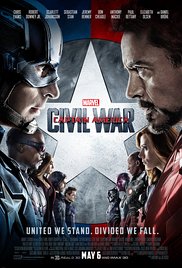 “Whoa, whoa, whoa,” you might be thinking. “Mr. BFS, you think Captain America: Civil War, is a bad movie? The movie that has better critic and user reviews on Rotten Tomatoes and IMDB than the Captain America movies that came before it? Is the air a little too thin where a tall person like you walks?”
“Whoa, whoa, whoa,” you might be thinking. “Mr. BFS, you think Captain America: Civil War, is a bad movie? The movie that has better critic and user reviews on Rotten Tomatoes and IMDB than the Captain America movies that came before it? Is the air a little too thin where a tall person like you walks?”
No, it’s not too thin, I get plenty of oxygen, and I’d especially like you to note the title. Civil War is a bad Captain America movie. It loses track of the person it’s supposedly about (even the movie poster does it: “Civil War” is larger than “Captain America,” you have to squint to see his name in red over there), and it’s more overstuffed than me trying to fit into the jeans I could wear in college.
So let’s do this someone is wrong on the internet thing. Now, don’t get me wrong, there are good things about Civil War. It has some powerful themes and ideas it’s working with, like revenge, individuality, morality, heroism, and what all those look like when society and politics have their say. Especially notable are the villain (if there is only one), who is not your typical, mustache-twirling type, and the Black Panther’s personal story arc, which moves palpably from grief to anger to vengeance to acceptance, no matter how familiar that arc might be.
If the movie focused on the problems and ideas it brings up, I would be more in agreement with the critics that have it hovering at 90% on Rotten Tomatoes. Because genre and comic books aren’t just for kids, nor are they only capable of being shallow, momentary bits of fun: they have the capability to deal with tough issues in an intriguing, memorable way that is different than stories that hew more closely to the realism of our everyday world.
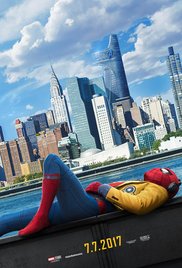
The problem is that Civil War doesn’t have focus. Can you follow its plot from A to B without confusion? Sure. But there are so many unnecessary detours and characters along the way. The most noticeable culprit is the inclusion of Spider-man, who’s basically there to help get people to attend Civil War (thanks to his appearing in the trailer) and to drum up interest in his own movie which has just hit theaters now, a year later.
Even if this were an Avengers movie (which I’m going to note again that it’s not), Peter Parker’s presence does nothing for this movie’s storyline. We have an extended detour to introduce him (5-10 minutes or so? longer? quite a bit in movie terms) and then he gets to hang out in a huge fight scene before departing, doing nothing to further the movie’s plot or themes. I love Spider-man, he’s a favorite of mine since I was young (and I loved the first two Tobey Maguire movies), but his inclusion here is badly handled and not needed.
If you still need convincing, contrast Spider-man’s role in the movie with Black Panther’s. You can’t take out the latter’s character without the movie weakening substantially, both in its plot and emotional resonance. Spidey can be taken out with nary a hiccup, and his hijinks in the airport fight could be easily accomplished by one of the MANY other characters there (and let’s face it, giant Ant-Man stole the show on that one).
But I keep coming back to the title of this review/post. This movie is an outright disservice to Captain America, one of the most interesting characters of the Marvel Cinematic Universe. From the moment I saw the trailer for Cap’s first movie and watched Steve Rogers fall on a grenade to save his fellow soldiers, I couldn’t help but love him. His first two movies really embrace who he is as a character and let him shine, whether he’s hucking his shield at Nazis, trying to engage Peggy Carter’s interest, or dealing with a whole host of personal, emotional, or moral issues.
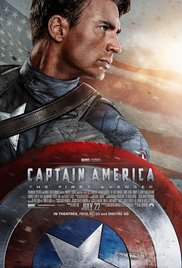
We lose track of him in this movie. He’s so often an outside player whose motives we can’t completely grasp, from a shoehorned romantic moment to what had to have been some agonizing quandaries over the things his best friend, Bucky, has done in his brainwashed past. Compare that to his first movie, which is reviewed significantly lower than Civil War, but let’s us get to know the guy and what he’s thinking. We know why he turned out so differently from Red Skull after receiving the Super Soldier serum. We know why he’s frustrated when he isn’t allowed on the front lines, and we want him to make a difference just as much as he does. When he’s finally allowed to do his thing, there’s an emotional tension valve released for him and the audience. It’s a movie I want to watch more than once, and have.
Civil War? Saw it the once and don’t care to see it again. Even if I think about it more like an Avengers movie (which I definitely have tried to), I keep coming back to what a big, chaotic mess it is. No matter how interesting its themes and ideas are, it tried to do too much. As more than one good critic and artist has noted, just because you can do more (more CGI, more characters, more action, etc.) doesn’t mean you should.

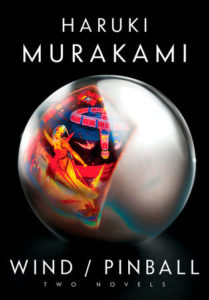 Mood. An important factor in any book, but Haruki Murakami is a master of it. “He’s kind of weird?” people like to say, “but he’s cool, too, I couldn’t get this story of his out of my mind.” If you want to get technical in literary terms, he’s a surrealist, which is the fancier, upmarket way of saying he uses fantastic elements in his work (or a kind of magical realism): his books start out feeling like normal, everyday life, but before you know it, there are crazy conspiracies and alternate realities being fitted into the plot quite neatly and naturally.
Mood. An important factor in any book, but Haruki Murakami is a master of it. “He’s kind of weird?” people like to say, “but he’s cool, too, I couldn’t get this story of his out of my mind.” If you want to get technical in literary terms, he’s a surrealist, which is the fancier, upmarket way of saying he uses fantastic elements in his work (or a kind of magical realism): his books start out feeling like normal, everyday life, but before you know it, there are crazy conspiracies and alternate realities being fitted into the plot quite neatly and naturally.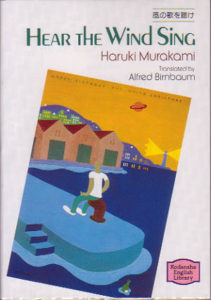 Hear the Wind Sing
Hear the Wind Sing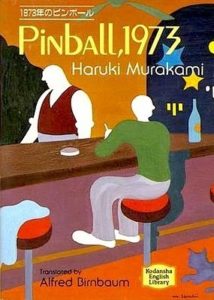 Pinball, 1973
Pinball, 1973